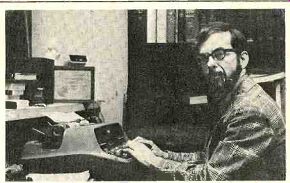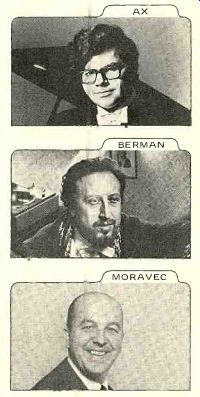by JAMES GOODFRIEND

KEEPING TABS
FOR those whose principal experience of music is through records, the live concert provides a vital balance. For one thing, it enables the listener to compare a performer's concert personality with his recorded one.
For another, it is a vital check on the actual abilities of the performer, a way of knowing whether he can duplicate, on a given occasion, the best of which he is capable in the studio. For a third, it keeps one up to date on the accomplishments of performers who may not, for whatever reason, have made recordings in several years. Not too long ago, it would have seemed the height of insolence to have to justify concerts in this way, but times have changed. Some of the most sophisticated and knowledgeable music listeners haven't been to a concert in years.
I have had the opportunity to go to quite a few recently, including ones by Dietrich Fischer-Dieskau (his voice sounded better in Carnegie Hall than it has on some recent discs) and the London Philharmonic led by Bernard Haitink (they seemed a first-rate orchestra, with a particularly wonderful viola section and excellent woodwinds). But three concerts in particular-all piano recitals stand out, not only for their quality, but for the opportunity they provide to supplement the critical coverage this magazine has given over the years to the three artists involved.
THE young Emanuel Ax, who records for RCA, gave a recital in the tiny (it seats about forty-on bridge chairs) ground-floor room of the Bloomingdale School of Music on New York's Upper West Side. It was an indication of the sort of following that Ax has already developed that people came from as far away as eastern Long Island to hear the recital. Ax had a rotten cold, and some of the tempos he chose could rightfully be put down to his de sire to get things over with and get home to bed. Even so, it was a fascinating recital.
He began with a Mozart sonata, and none too auspiciously, for, like most young pianists, he didn't really know what to do with it.
The notes, of course, were perfect, the dynamics reasonable; he did no violence to the music. But he totally missed its operatic qualities, the wordless arias and ensembles as well as the drama that lie beneath the surface of the music. A Beethoven Les Adieux was considerably better (with a beautifully judged, FEBRUARY 1977 poignant opening), but the Ravel Valses No bles et Sentimentales that followed was on another level of excellence entirely. I had expected his considerable abilities as a colorist to shine here, but what I hadn't expected was the sensuous warmth of the rhythms, the way Ravel's Viennese models glowed through the Gallic patina. It was a remarkably fine performance. The Chopin later in the recital showed mostly that, sick or well, Ax is al ready an excellent "Chopinzee" (as they called them in the old days) and is liable to develop into a great one.
THE Russian virtuoso Lazar Berman gave a recital at Carnegie Hall and, as might have been expected, packed the house. His pro gram was simplicity itself: Schumann's Sonata No. 1 , in F-sharp Minor; intermission; Liszt's Transcendental Etudes (misprinted in the program as the Transcendental Etudes after Paganini, a quite different set); two encores-- It was a concert that, among other things, could revise one's comparative opinions of Schumann and Liszt, for the Schumann came across as an almost interminable torrent of notes and afterthoughts, the Liszt as incredibly great and expressive music (my opinion, of course). Schumann's work suffers from its title; lacking the poetic references of Carnaval or Waldscenen, it leads one to expect more formal drama-and one doesn't get it. Berman gave an impressive display, how ever, and he obviously likes the piece (he said so afterwards). I could not fault his performance (except for playing the thing at all), and I'm inclined to attribute my boredom to the piece rather than to the player.
Berman, who currently records for both Columbia and Deutsche Grammophon (older records may be found on other labels), made an absolutely stupendous recording of the Transcendental Etudes (Columbia/Melodiya M2-33928). Any doubts that might have exist ed about his being able to duplicate the feat in the concert hall were put totally aside that evening, He tore up the keyboard and he tore down the keyboard, he buckled the knees of the piano and his fingers wafted over the keys like a summer breeze, and what came out of the whole affair was not so much the greatest technical display anyone has heard for decades, as it was music. Some people need difficulties. What has happened to Berman since his earliest records is that he has so mastered the complex difficulties of technique that he can search for and expose the personality and the music that lie buried within it-provided they are there. In the Liszt Transcendental Etudes they are indeed there.

THE Czech pianist Ivan Moravec appears relatively rarely in this country. His recordings are available on Connoisseur Society, Vanguard, and Supraphon, and while many of them received lavish critical praise in the past, there have not been too many new ones recently. He gave a recital in Boston's Jordan Hall and a drew a capacity audience that seemed to comprise at least as many record collectors as regular concert-goers. The seriousness of his program-Beethoven, Beethoven, Brahms, Chopin, Debussy, and five encores-might be inferred from the fact that only a single short piece was in a major key.
Moravec is a special kind of pianist, and I know few (if any) of that kind to equal him.
He plays lyrically and he plays dramatically, but he is a perfectionist rather than a virtuoso, and his aim is not only to project the mood and sense of a piece, but to let you hear all those things that are in it that you perhaps hadn't heard before. Bass lines, inner voices, harmonic variations, subtle motivic relation ships, all come drifting at you simultaneously.
Listening to him play is like being immersed in the music; there is no hall, there is no audience; there is no pianist. There are only you and the music. His Brahms Capriccio was the most poetically analytic performance of that work I have ever heard-and, probably, the most satisfying. His Chopin A Minor Valse Brillante will sing its ghostly song in my head for many years to come.
Given the type of pianist he is, Moravec's live performances are very close to his recordings, for they both aim at the same thing.
He has, though, if anything, gotten even better with the years.
Also see:
Advent Chromium-Dioxide tape (ad)
Source: Stereo Review (USA magazine)